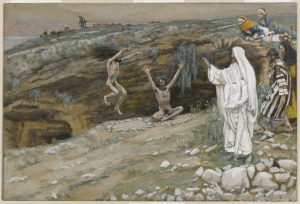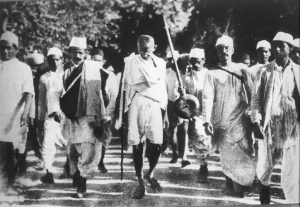The Scream of Demons

There are a handful of episodes in the four gospels that tell in dramatic detail of Jesus casting out a demon. One such incident is the story of the Gadarene man, (Matthew 8:28-34) whose spirit-possessed behavior is so disruptive that his neighbors drag him out of the village and chain him to the gravestones.
The demons can’t remain hidden once Jesus arrives. We hear their voices, realize that they’re scared, discover that they are very familiar with Jesus, and then witness some last nasty act.
Reading this story slowly and deliberately reveals several insights about the Bible’s view of the demonic realm. First of all, the man’s demons recognize who Jesus is the moment he arrives at the graveyard. The reader may glide past this detail. But a careful examination of how people are reacting to Jesus in those early days of his public life, suggests that no humans, not even the disciples, have a clear ideas of who Jesus really is.
It’s important also to notice that the demons are terrified. They speak to Jesus in a creepy way through the poor man who has been chained up. The evil spirits know with chilling clarity that Jesus intends to throw them out, and they bargain frantically for their lives.
Jesus effortlessly sends the demons away to occupy a herd of pigs who charge into the water. We read this story and realize that the demons are vastly weaker than Jesus. Pathetically, demons rarely disappear quietly. There’s always a little screaming and writhing as they go down.
As I thumbed through the Gospel’s demon stories, I began to see the exorcisms as one of the ways that Jesus brings liberation to people. Demons regard Jesus like kindergartners who are being bullied by older kids. Jesus is no bully. But like kindergartners walking to school without their parents, the demons are wary of Jesus.
Something else, something even more interesting, shines through Jesus’ encounters with demons. Jesus seems to smoke them out. The demons can’t remain hidden once Jesus arrives. We hear their voices, realize that they’re scared, discover that they are very familiar with Jesus, and then witness some last nasty act. We might say that Jesus’ ministry is diagnostic. He exposes a piece of the spiritual kingdom of evil and he exposes its weaknesses.
The Religion Leaders
Demons aren’t Jesus’ only opponents. Sometimes religious officials lurk at the edge of a crowd that is watching as Jesus is casting out demons. (Mark 1.21-28) These priests, scribes, or Pharisees are quick to smear Jesus, saying, “He’s a Sabbath breaker,” or “He casts out demons by the power of demons.”
In reading the gospel accounts of Jesus’ ministry one gets the impression that Jesus is never free from criticism and whispered plots.
So, what starts with Jesus confronting spiritual possession suddenly becomes a light shining on the religious leaders. The crowd is high-fiving and rejoicing over a friend’s release from demonic possession. And the religion leaders stand in the background with arms folded and frowns on their faces. Not only do we learn something about the world of spiritual evil, we also learn about how religion can be very confused and lead people astray. Jesus’ presence smokes the religious officials’ anger and jealousy out of the crevices.
In reading the gospel accounts of Jesus’ ministry one gets the impression that Jesus is never free from criticism and whispered plots. Not only are demonic powers lined up against Jesus, but so is big religion and the authorities of the Roman Empire. All are trying to muscle Jesus into submission to the world’s deep powers. If you paste together every trick question, character denigration, and plot against Jesus’ life, you will have a collage that composes a picture of the underlying powers that dominated people’s lives in Jesus’ time.
“Pushback”
The expression, pushback, perfectly describes the opposition that Jesus faced throughout his public life. Whenever pushback appears in Jesus’ ministry, it lights up the power system that is anxious enough to come out of hiding in order to lash out.
Pushback is more than counter-attack. It’s diagnostic. When authority or tradition resorts to retailation and intimidation, we can be sure that we’re close to what Walter Wink has labeled the “dominion system.” The Dominion System is a network of deep powers that control customs and nations. When King Herod sends his thugs to kill babies, (Matthew 2.16-18) he is coming out of concealment to reveal his frantic clutch on power. Herod’s scheming shines a blazing light on his own ruthlessness. And his self-absorption.
Pushback as diagnostic isn’t confined to Jesus’ experience. Journalist, Chris Hedges, tells the story of his son when he was a student and athlete at Colgate University. In a locker room, he heard athletes talk about hazing and date rape that was part of campus fraternity life. In the tradition of his father, the younger Hedges wrote a lengthy article that uncovered what went on in Fraternity Houses. He got his work published in the college newspaper.
When authority or tradition resorts to retailation and intimidation, we can be sure that we’re close to…the “dominion system.”
The article was greeted by anger–especially among alumni–over the damage it portended for fraternities’ reputations. The university informed Hedges via email that he would no longer be publishing in the college newspaper. And, as Chris Hedges describes his son’s experience, it became clear that the administration fretted not over the misbehavior or the threat to women students, but with keeping the entire situation quiet.
When the crack-down comes, when punishment is applied, when there is an attempt to damage someone’s reputation in response to something they’ve done or said, you may be sure that someone is encroaching on the interests of the dominion system.

Gandhi’s March to the Sea
In 1930, Mahatma Gandhi launched his now-famous Salt March in protest of British Empire laws requiring that salt in India be produced and taxed under Empire authority. Before India was a British colony, Indian peasants made their own salt from sea water.
As Gandhi made the 340 mile trek from Sabarmati Ashram to the coastal village of Dandi, more and more of his fellow Indians joined him. Soon the procession stretched out for two miles. Every village along the route greeted the marchers with music and feasting. As the marchers walked, fresh acts of civil disobedience, boycotting, and defiance of British laws broke out all over India.
Though the demonstrations were non-violent, British authorities were unable to refrain from pushing back. Their crackdown included passing more laws, imposing censorship on correspondence, and declaring Gandhi’s organization illegal. Official retaliation culminated in the Qissa Khwani Bazaar Massacre, in which soldiers under British command, killed 250 people by firing machine guns into the crowd.
History’s assessment of the Salt March found that it made little progress towards Indian independence. The British Empire made no concessions to the protesters. Indian Muslims refused to support the program, and several of Gandhi’s associates drifted from him. In mere weeks after the Gandhi’s March to the Sea, British authorities had recovered firm control of the entire sub-continent.
There was, however, one change that mattered. A light shined on the injustice that reigned in India.
Related Article: “The Man Who Brought Nonviolence to the Civil Rights Movement“
World opinion shifted. In India, Britain, and the world in general, policy governments acknowledged the injustice of British domination of India without popular support. The Salt March drew a dominion system out of the shadows. More than thirty years later, Gandhi’s movement and the March to Dandi inspired American activist Martin Luther King, Jr., and his fight for civil rights for blacks in the 1960s.
The Cross
In the middle of his public career, Jesus made a decision to travel to Jerusalem. Jerusalem was the regional power center both for the Empire and for faith leaders. Within Jerusalem’s walls lay the great Second Temple and the Roman Empire’s military headquarters. Jesus’ trip to Jerusalem triggered the most fierce push back that either he or his disciples would see. Within days of his arrival in the great city, following a hasty trial, Jesus was hanged on a Roman cross.
Had Jesus not gone to Jerusalem, the magnificent darkness would have lain in the shadows for a long time working its slow destruction of everything good, true, and beautiful.
In its face, the crucifixion was a terrible tragedy. But since it happened, Christians have discovered a number of benefits that Jesus’ self-sacrifice brings. Preachers have long interpreted Jesus’ death in a spiritual way, namely that it brokered a transaction between God and believers that enabled them to be re-admitted into God’s good graces. Forgiven, believers also qualify for eternal life in God’s presence.
I would propose yet another benefit of Jesus’ execution, not one that displaces or minimizes other interpretations such as the one just cited, but one, which reveals another open door to freedom. The sordid and tragic loss of Jesus’ life in Jerusalem casts a bright light on a system of power that dominated life in Jerusalem and in the countryside around. That power system was some alliance between state military power, religious authority, and prestigious leadership individuals.
Doubtless, other elements were in play that brought Jesus to his death. These included the screaming crowd of Passover pilgrims, a disgruntled disciple, the Temple establishment, and the unseen spiritual powers that Jesus tangled with throughout his public life. These and other factors composed a dark synergy that Paul described with these words:
not…flesh and blood, but against the rulers, against the authorities, against the powers of this dark world and against the spiritual forces of evil in the heavenly realms.
Had Jesus not gone to Jerusalem, the magnificent darkness would have lain in the shadows for a long time working its slow destruction of everything good, true, beautiful.
It’s the turning on of the light that fascinates me.

One Reply to “The Scream of Demons”
Quote from Article on Opposition Research: Alan Huffman: “Michael and I are both trained as journalists, and we approach all of this the same way we would if we were writing for a publication. So, no, there are no dirty tricks on our end, but there are sometimes things that are directed at us. We get death threats, we get followed, all kinds of things like that happen — which just serves the purpose of telling us that we’re getting warm. We like it when that happens because it tells us that we’re on the trail of something that somebody is afraid of. https://fivethirtyeight.com/features/an-introduction-to-the-dark-arts-of-opposition-research/